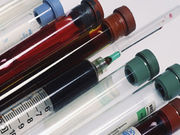Baseline testing rates 89.3, 88.8 percent for alanine aminotransferase, aspartate aminotransferase
MONDAY, July 18, 2016 (HealthDay News) — Most Medicare fee-for-service beneficiaries with dyslipidemia who initiate statins undergo baseline alanine aminotransferase (ALT) and aspartate aminotransferase (AST) testing, according to a study published in the Aug. 1 issue of The American Journal of Cardiology.
Matthew L. Maciejewski, Ph.D., from the Durham Veterans Affairs Medical Center in North Carolina, and colleagues examined disparities in guideline-concordant baseline laboratory testing and abnormal laboratory values in a retrospective cohort of 76,868 Medicare fee-for-service beneficiaries from 10 states. Participants had dyslipidemia and initiated a statin from July 1 to Nov. 30, 2011.
The researchers found that baseline laboratory testing rates were 89.3 and 88.8 percent for ALT and AST, respectively. The likelihood of having ALT and AST testing was increased slightly for older adults if they were dually enrolled in Medicaid (relative risk, 1.01) or had multiple chronic conditions compared with none or one condition (relative risks, 1.03, 1.08, and 1.14 for two to three, four to five, and six or more conditions, respectively). Non-Hispanic blacks were less likely than non-Hispanic whites to receive baseline testing (odds ratio, 0.97). Males were less likely than female beneficiaries to receive testing (odds ratio, 0.99). Abnormal values were rarely observed.
“In conclusion, ALT and AST assessment after statin initiation was commonly done as recommended, and there were negligible disparities in testing rates for beneficiaries,” the authors write.
Several authors disclosed financial ties to the pharmaceutical industry.
Copyright © 2016 HealthDay. All rights reserved.








